Richmond is a city that can bask in warm sunshine while its heavy rains can turn backyards into puddles and fences into swollen planks. This mix of humidity, downpours, and long freeze-thaw winters quietly breaks down materials that look solid at first glance. It’s not just about what kind of fence you choose. It’s whether it can actually stand up to shifts in climate.
Homeowners across the metro area know how tough it is to keep outdoor structures in shape. Our region gets about 43 inches of rainfall each year, along with steamy summers and unpredictable cold snaps. These conditions test every joint, post, and panel over time which is why material selection is the key to a fence that lasts more than a few seasons.
When planning a new build or upgrade, work with Richmond’s reliable fence installation team, who know how weather, soil, and installation methods work together. This guide explores how wood, vinyl, and metal fences perform under local conditions and what it takes to build one that holds strong year after year.
What Your Fence Is Up Against
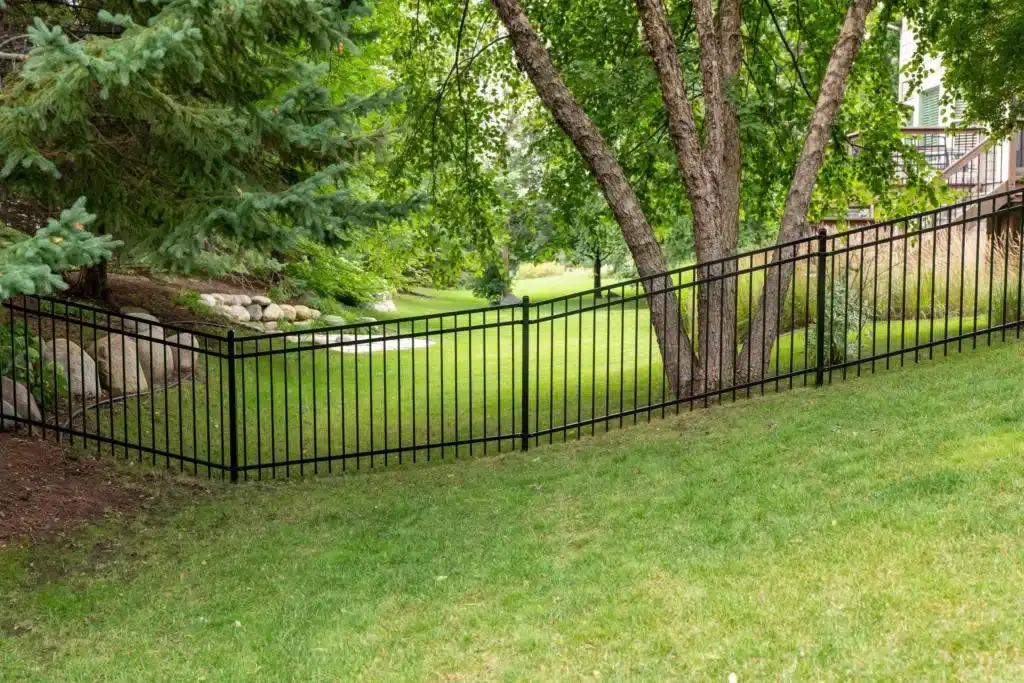
Richmond sits in a humid subtropical zone, which means long, moist summers and cold, unpredictable winters. According to the National Weather Service, temperatures can swing from below freezing in winter to above 95°F in summer.
Those shifts wreak havoc on fences. Heavy rainfall and clay-rich soil can hold moisture near fence posts. Also, summer UV exposure fades wood and weakens finishes. In winter, freeze-thaw cycles make the soil expand. This pushes posts out of alignment and stresses concrete footings. If materials don’t match the environment, even a strong fence can become a maintenance problem over time.
How Wood Fencing Performs in Richmond
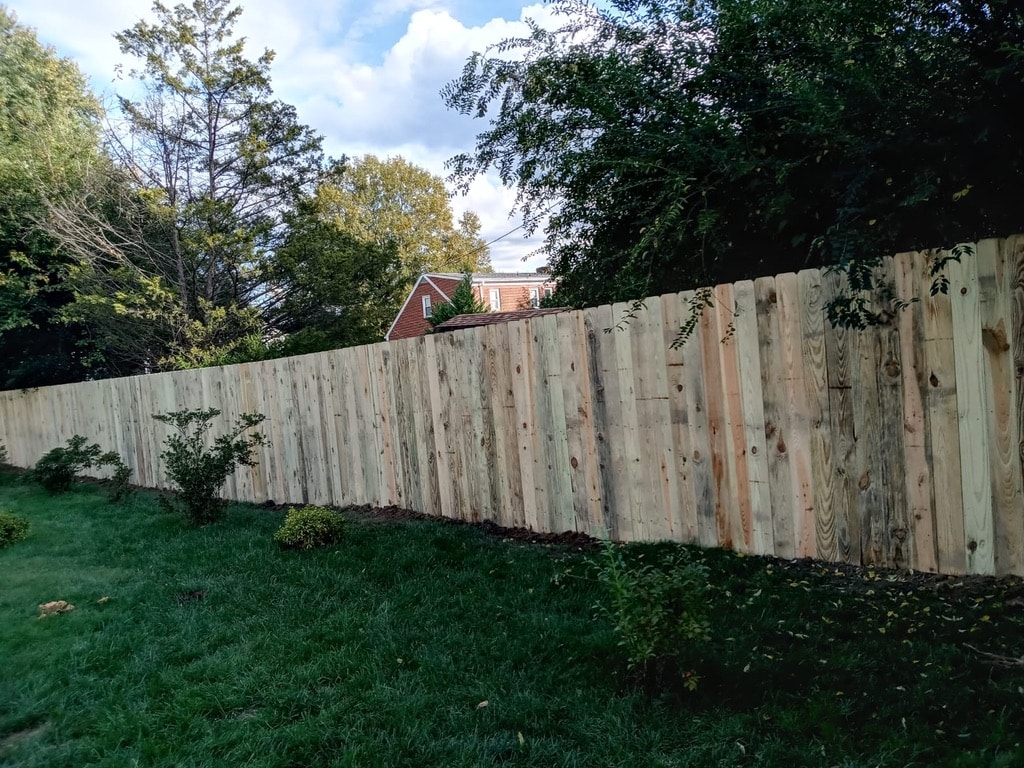
There’s a reason wood remains a favorite across Richmond’s neighborhoods. It’s warm, timeless, and naturally blends into tree-lined properties. In a humid area with regular rain, wood fencing requires regular care to look good and work well.
Pressure-treated pine is affordable and insect-resistant, making it a popular choice. However, it must be re-stained every two to three years to keep out moisture. The stain acts as a barrier against rain and humidity, helping prevent warping and rot.
Cedar, on the other hand, is naturally rot-resistant. Its aromatic oils help it stand up to moisture, especially in areas with slower drainage or shaded yards. Still, sealing cedar every few years strengthens its resistance to damp conditions.
Maintenance tips for wood fences:
- Inspect every spring for soft spots, mildew, or loose boards.
- Power-wash and re-stain in early fall before the colder months.
- Keep shrubs trimmed and soil away from fence bases to improve airflow.
For design inspiration, explore our related guide on fence styles that boost property value in Richmond to see how different materials can blend beauty with performance.
How Vinyl Fencing Handles Humidity and UV Exposure
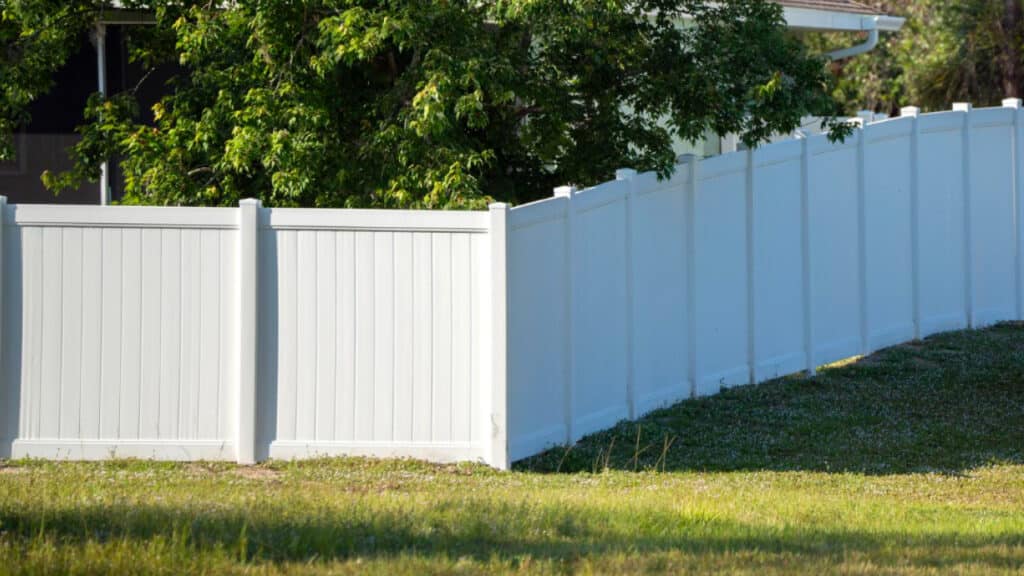
Vinyl fencing has quickly become a go-to solution for homeowners who want minimal maintenance and maximum longevity. Unlike wood, vinyl doesn’t absorb moisture. It won’t swell, rot, or crack, even after repeated exposure to humidity or storms.
In hot, bright summers, high-quality vinyl resists UV degradation thanks to stabilizers built into the material. That means less fading and no flaking paint. Vinyl fences also handle rainfall exceptionally well, making them ideal for backyards with limited drainage or shaded areas where wood might trap moisture.
The key to long-term performance lies in the installation. Vinyl expands and contracts slightly with temperature changes, so post spacing and alignment must account for this movement.
Vinyl care checklist:
- Rinse gently every few months to remove pollen and dirt.
- Check post caps and connectors after winter frost.
- Avoid leaning heavy equipment or storage bins against panels.
How Metal Fences Hold Up Against Rain and Clay Soil
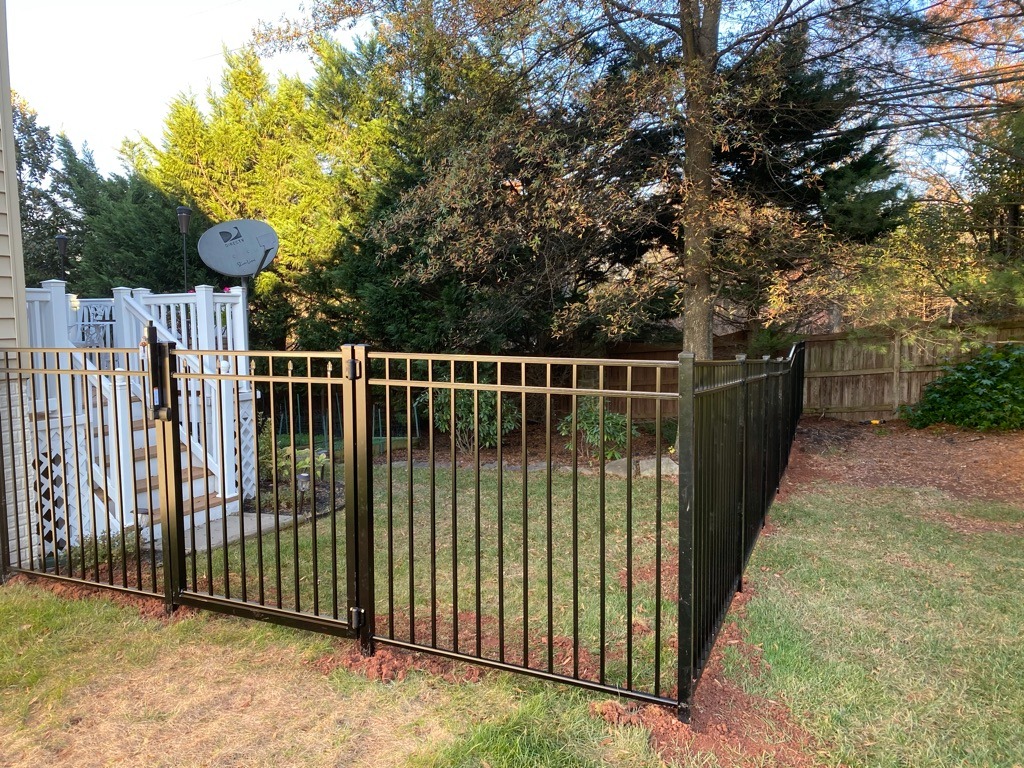
Metal fences bring unmatched strength and sophistication, from classic wrought iron to modern aluminum. In Richmond’s humid climate, the right finish determines whether a metal fence thrives or corrodes.
Aluminum fencing stands out as the best low-maintenance metal option. It won’t rust and performs well in areas with high moisture and occasional flooding. Its lightweight design makes it easy to install on uneven ground while maintaining rigidity and style.
Steel or wrought iron fences provide heritage appeal and durability but require protective coatings to prevent rust. A powder-coated or galvanized finish helps these fences resist corrosion from frequent rainfall. Touch-up paint or sealant should be reapplied annually to maintain the coating’s integrity.
Chain link fencing remains a practical, budget-friendly option for homeowners who need strength without complexity. It performs well in damp soil, but regular cleaning prevents discoloration from red clay or mineral-rich water.
Metal maintenance quick guide:
- Inspect coatings yearly and reapply as needed.
- Keep the base clear of mulch or soil buildup.
- Rinse periodically to remove grime and acidic pollen.
Groundwork and Installation Tips
Even premium materials fail if they’re not properly installed. Richmond’s soil varies dramatically — clay-heavy in some areas, loamy in others — and that directly affects fence stability.
Installation essentials:
- Set posts at least one-third of the total fence height deep (typically 30–36 inches).
- Place a gravel base beneath each post before adding concrete to promote drainage and reduce frost heave.
- Adjust footing depth for high-clay zones to prevent shifting during freeze-thaw cycles.
Dubon Fencing & Polished Concrete adapts every project to these local soil differences. By adjusting concrete mixes and anchoring techniques, we ensure every fence stays secure through the city’s rainiest months.
Maintenance Calendar for Richmond Homeowners
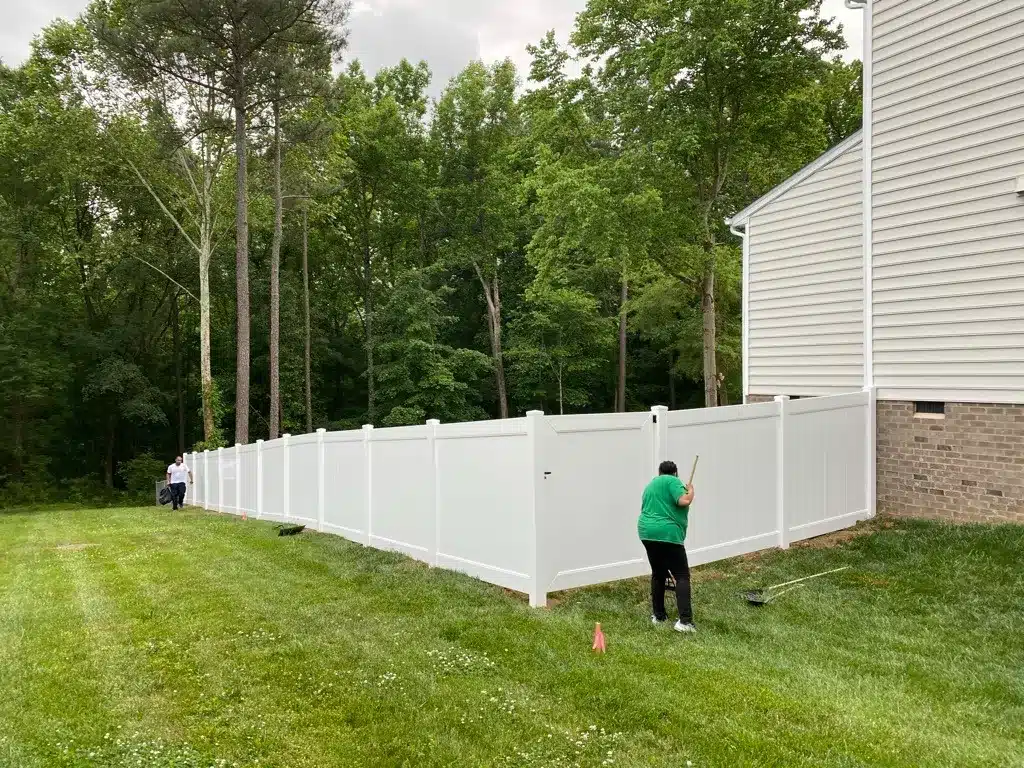
Sticking to a seasonal routine keeps your fence resilient in Richmond as regular checks catch small issues before they turn into repairs.
| Season | Task | Why It Matters |
| Spring | inspect for frost or soil movement | freeze-thaw cycles loosen posts |
| Summer | power-wash and recoat finishes | UV and humidity cause fading |
| Fall | seal wood and tighten hardware | prepares for heavy rain |
| Winter | clear leaves and snow from bases | prevents ice buildup and cracking |
Choosing the Right Fence for Your Home
Every property is different, and your choice should balance curb appeal, durability, and maintenance.
- Wood: Timeless and customizable, ideal for homeowners who don’t mind seasonal care.
- Vinyl: Durable and virtually maintenance-free. Perfect for humid, low-drainage areas.
- Metal: Strong, secure, and elegant, best for long-term property value.
Build Smart, Not Just Strong
Richmond’s climate doesn’t forgive shortcuts and neither should your fence. With weather patterns that shift from damp to freezing, your best defense is a fence built for local conditions.
Dubon Fencing & Polished Concrete combines craftsmanship with experience, setting posts to the right depth, sealing materials properly, and using concrete mixes suited for Virginia’s soil. The result: a fence that stands firm season after season.
Call (804) 402-9980 or request your free estimate today to build a fence designed for Richmond’s weather and built to last.
